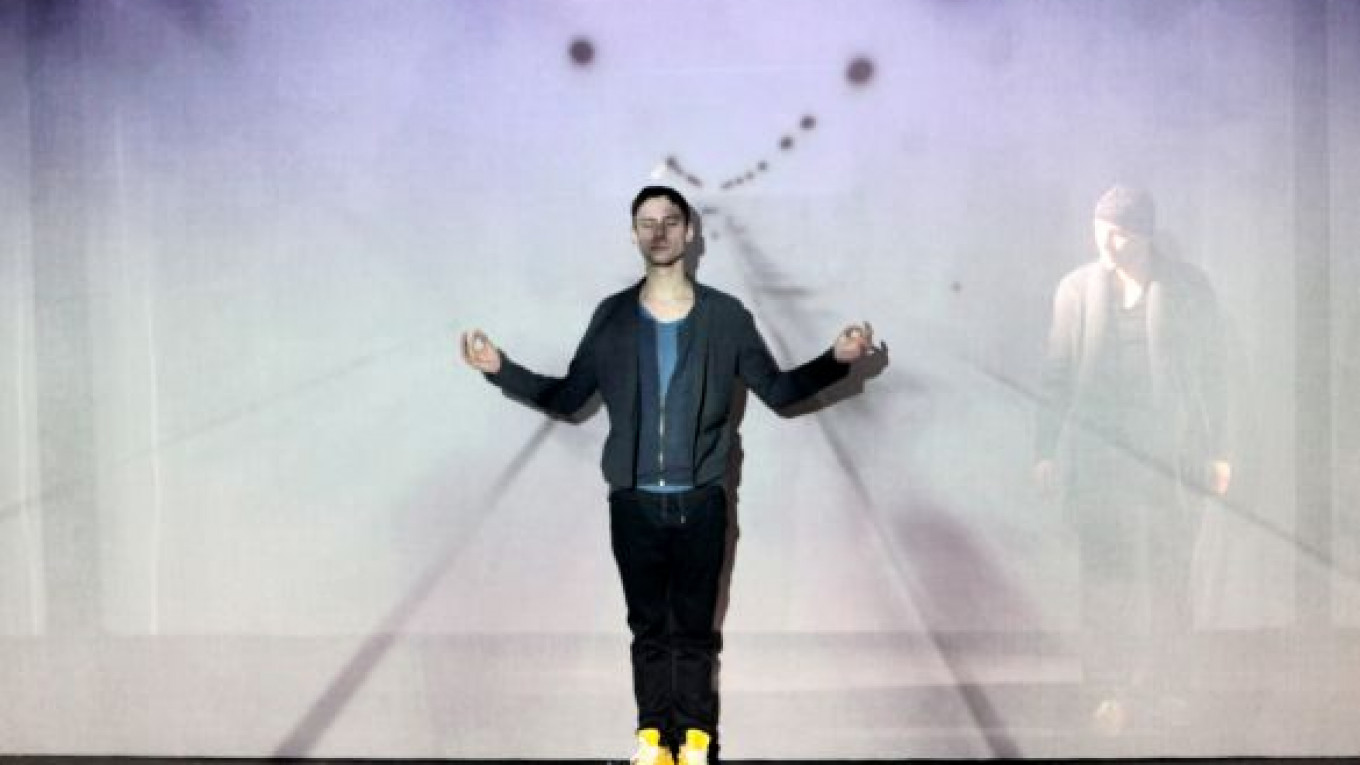Lyubov Strizhak’s “Sneakers” at Praktika Theater has all the hallmarks of many new plays that have surfaced in Moscow as of late. It is hip and uncomfortable in polite measure, and it sings the electric song of youth.
On the downside, it looks as if it has been chiseled out of the same stone as so many other portraits of young people struggling to discover their identity in a world of insensitive elders.
There certainly is a good reason for that. Strizhak is a newcomer to the ranks of Russian playwrights, and “Sneakers” was her first play to have serious impact, enjoying readings at several new play festivals, including Moscow’s Lyubimovka in September.
The story is of a 20-something named Grisha, whose biggest worry right now is getting down to the store to buy himself a new pair of sneakers. Everybody is against him, though. His parents, his boss at work and his friends all have other ideas of what he should be doing with his time. Some think he should be more responsible, others are sure he should be less.
The latter group is made up of his friends, of course, and they have the biggest influence on Grisha. As a result, he ends up taking detours all day long — from smoking marijuana at a friend’s apartment to tripping the light fantastic at a nightclub. In what I thought was one of the play’s lamer moments, he even ends up headed off in the direction of a political protest.
“The Odyssey” this is not, although the generic influences of Homer’s epic are evident. If “Sneakers” is to be considered a play for young people — a teenage drama — there is plenty to recommend it. If it is to be put alongside other plays of recent times that have redefined the shape and scope of Russian drama, it falls plenty short.
Director Ruslan Malikov gave the play a slick sheen that includes video images, snappy color combinations in the costumes, the use of semitransparent scrims in Yekaterina Dzhagarova’s set, and clean lighting by Nikita Chernousov. In short, the piece looks good, and aided by the choreography of Sergei Zemlyansky, it usually moves at a fairly brisk pace.
Malikov employs nonrealistic gestures and action that are intended to keep the performance a long distance from realism or naturalism. When people sit down at the table to eat, they rub their tummies. When three women chat about the men in their lives, they stand mimicking the kind of movements they might make if they were working out at the gym.
The story itself, however, takes us few places we have never been.
There is talk of marriage; there is more than just talk of infidelity. The former is “so old-fashioned” Grisha tells us and his friends.
There are complaints about misunderstanding parents, and there are parents who do not understand. In some cases they do that aggressively. In others a clueless mother mistakes the smell of marijuana for incense.
There are limp efforts to make sense of the contemporary world. “Sometimes I think I have nothing to add to this world, not because everything already exists but because I am empty,” Grisha informs us. The play also attempts to set up a tenuous connection to contemporary spirituality. “I don’t believe in God, but I hear rumors that God believes in me,” Grisha’s friend Sasha intones.
But when Grisha ends up careening off on a collision course with the Moscow police at a political rally, he does it for no discernible reason. “I’m feeling kind of disagreeable today,” he declares as he decides to join the March of Those who Disagree on Mayakovsky Square.
It’s all very cool, yes, if this is your kind of cool. But it also comes across as more than a bit infantile.
There is an interesting footnote to this, however. So before my stormy criticism falls too hard on Strizhak’s head, I am compelled to point out that she is the same author who provided some scintillating texts for the opening performances at Kirill Serebrennikov’s new Gogol Center in early February.
It’s important to note that here specifically because in those texts Strizhak demonstrated a willingness and capability to explore themes and dialogue that are far more potent than what I found in “Sneakers.”
Therefore, this new production can probably be seen as a first step, a first attempt to fly. Taken on that level, it is of interest. I do look forward to what else Strizhak might give us.
“Sneakers” (Kedy) plays March 25, 26 and 29 at 8 p.m. at Praktika Theater, 30 Bolshoi Kozikhinsky Pereulok. Metro Mayakovskaya, Pushkinskaya. Tel. +7-495-544-5545, 495-699-4492. www.praktikatheatre.ru. Running time: 1 hour, 30 minutes.
Contact the author at [email protected]
A Message from The Moscow Times:
Dear readers,
We are facing unprecedented challenges. Russia's Prosecutor General's Office has designated The Moscow Times as an "undesirable" organization, criminalizing our work and putting our staff at risk of prosecution. This follows our earlier unjust labeling as a "foreign agent."
These actions are direct attempts to silence independent journalism in Russia. The authorities claim our work "discredits the decisions of the Russian leadership." We see things differently: we strive to provide accurate, unbiased reporting on Russia.
We, the journalists of The Moscow Times, refuse to be silenced. But to continue our work, we need your help.
Your support, no matter how small, makes a world of difference. If you can, please support us monthly starting from just $2. It's quick to set up, and every contribution makes a significant impact.
By supporting The Moscow Times, you're defending open, independent journalism in the face of repression. Thank you for standing with us.
Remind me later.







